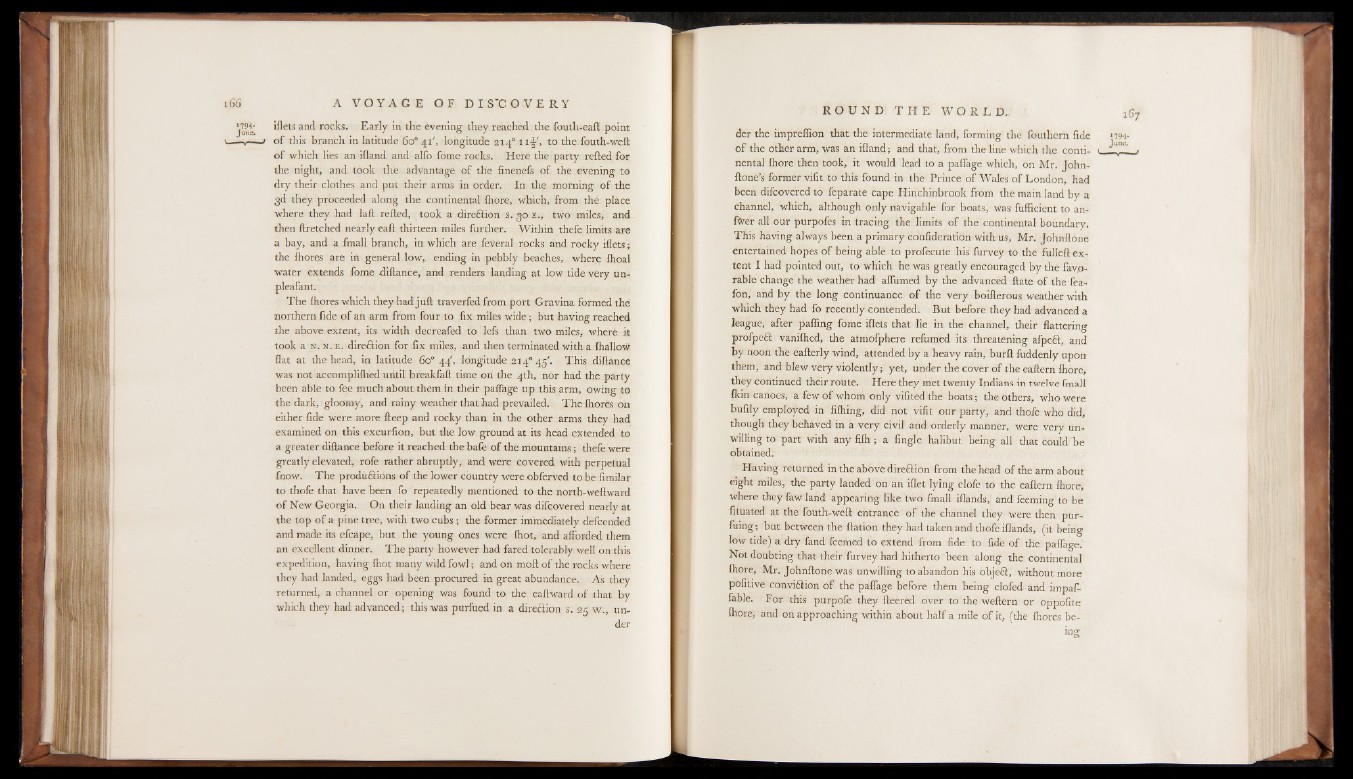
166 A V O Y A G E O F D I S ' C O V E R Y
June iflets and rocks. Early in the evening they reached the fouth-eaft point
'--------— J of this branch in latitude 60” 41', longitude 214° l i f ' , to the fouth-weft
of which lies an ifland and alfo fome rocks. Here the party refted for
the night, and took the advantage of the finenefs of the evening to
dry their clothes and put their arms in order. In the morning of the
3d they proceeded along the continental Ihore, which, from the place
where they had laft relted, took a direction s. 30 e . , two miles, and
then llretched nearly eaft thirteen miles further. Within thefe limits are
a bay, and a fmall branch, in which are feveral rocks and rocky iflets;
the Ihores are in general low, ending in pebbly beaches, where Ihoal
water extends fome diltance, and renders landing at low tide very un-
pleafant.
The (hores which they had juft traverfed from port Gravina formed the
northern fide of an arm from four to fix miles wide; but having reached
the above extent, its width decreafed to Iefs than two miles, where it
took a n . n . e . direction for fix miles, and then terminated with a fhallow
flat at the head, in latitude 60" 44', longitude 214“ 45'. This diftance
was not accomplilhed until breakfaft time on the 4th, nor had the party
been able to fee much about them in their paflage up this arm, owing to
the dark, gloomy, and rainy weather that had prevailed. The Ihores on
either fide were more fteep and rocky than in the other arms they had
examined on this excurfion, but the low ground at its head extended to
a greater diftance before it reached the bafe of the mountains; thele were
greatly elevated, rofe rather abruptly, and were covered with perpetual
fnow. The productions of the lower country were obferved to be limilar
to thofe that have been fo repeatedly mentioned to the north-weftward
of New Georgia. On their landing an old bear was difeovered nearly at
the top of a pine tree, with two cubs ; the former immediately defeended
and made its efcape, but the young ones were fhot, and afforded them
an excellent dinner. The party however had fared tolerably well on this
expedition, having fhot many wild fowl; and on moll of the rocks where
they had landed, eggs had been procured in great abundance. As they
returned, a channel or opening was found to the eaftward of that by
which they had advanced; this was purfued in a direction s. 25 w., under
der the impreflion that the intermediate land, forming the fouthern fide >794-
o f the other arm, was an ifland; and that, from the line which the conti- 1 .
nental Chore then took, it would lead to a paffage which, on Mr. John-
ftone’s former vifit to this found in the Prince of Wales of London, had
been difeovered to feparate cape Hinchinbrook from the main land by a
channel, which, although only navigable for boats, was fufficient to an-
fifrer all our purpofes in tracing the limits of the continental boundary.
This having always been a primary confideration with us, Mr. Johnftone
entertained hopes of being able to profecute his furvey to the fulleft extent
I had pointed out, to which he was greatly encouraged by the favorable
change the weather had affumed by the advanced ftate of the fea-
fon, and by the long continuance of the very boifterous weather with
which they had fo recently contended. But before they had advanced a
league, after pafling fome iflets that lie in the channel, their flattering
profpeft vanifhed, the atmofphere refumed its threatening afpeft, and
by noon the eafterly wind, attended by a heavy rain, burft fuddenly upon
them, and blew very violently; yet, under the cover of the eaftern fhore,
they continued their route. Here they met twenty Indians in twelve fmall
fkin canoes, a few of whom only vifited the boats; the others, who were
bufily employed in fifhing, did not vifit our party, and thofe who did,
though they behaved in a very civil and orderly manner, were very unwilling
to part with any filh; a Angle halibut being all that could be
obtained.
Having returned in the above direction from the head of the arm about
eight miles, the party landed on an iflet lying clofe to the eaftern Ihore;
where they faw land appearing like two fmall iflands, and Teeming to be
fituated at the fouth-weft entrance of the channel they were then pur-
fuing; but between the ftation they had taken and thofe iflands, (it being
low tide) a dry fand feemed to extend from fide to fide of the paflage.
Not doubting that their furvey had hitherto been along the continental
Ihore, Mr. Johnftone was unwilling to abandon his objeCt, without more
pofitive conviftion of the paflage before them being clofed and impaf-
fable. For this purpofe they fleered over to the weftern or oppofite
Ihore, and on approaching within about half a mile of it, (the Ihores being